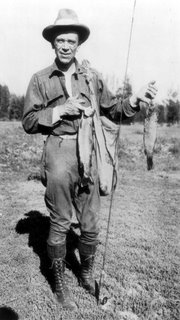Land Ethic

"Twenty centuries of 'progress' have brought the average citizen a vote, a national anthem, a Ford, a bank account, and a high opinion of himself, but not the capacity to live in high density without befouling or denuding his environment, nor a conviction that such capacity, rather than such density, is the true test of whether he is civilized." -- Aldo Leopold.
Naturalist and philosopher Rand Aldo Leopold was born on this day in 1887 in Burlington, Iowa.
Leopold’s reputation as the founder of Land Ethic conservation philosophy is a posthumous product, growing as a consequence of the publication of his beautifully written contemplation on man and his relation with nature, A Sand County Almanac and Sketches Here and There
His family was comprised of outdoor enthusiasts, and most of his early training came from his father, who instilled in him a strict code of sportsmanship. He attended prep school in New Jersey and entered the Sheffield Scientific School at Yale to study in America’s first school of forestry. He received his M.A. in 1909, just in time to get a job with Theodore Roosevelt’s newly-created U.S. Forestry Service. In Arizona and New Mexico, Leopold worked on timber gangs along the route that would become U.S. Route 666 (the Coronado Trail) and administered grazing and forest work in the Carson National Forest while promoting game conservation and the establishment of wilderness preserves.
In those days, however, his orientation was still predominantly economic: a forester’s job was to produce cuttable timber, and a game manager’s job was to produce shootable game. A bout with nephritis caused him to retire from the field in 1924, and in 1928 he joined the Sporting Arms and Ammunition Manufacturer’s Institute as a game surveyor. In 1933 he wrote Game Management
In 1935 he bought a piece of spent farm land along the Wisconsin River which became his family’s natural sanctuary. There he watched the land heal itself, reflected and began to write about the slow transformation of his own attitudes about the land. One formative experience he had was a mountain hunting episode along the Arizona-New Mexico border, where he and a group of sportsmen happened across a wolf and her 6 pups. After the party massacred the predators, a reflection of the prevailing attitude that eradicating wolves made for more shootable game, Leopold watched the mother wolf die and had an epiphany -- he suddenly understood the meaning of his labors from the point of view of the mountain itself, rather than simply from the sportsman. As he later concluded, a deer herd without wolves and lions "is more dangerous to wilderness areas than the most piratical senator or the go-gettingest chamber of commerce."
His interest subtly changed from game management to wilderness management, an effort to preserve the natural, ever-regenerating cycles of an ecology, leading to his formulation of a "land ethic" to stand alongside inter-personal human ethics, stated simply by Leopold as "a thing is right when it tends to preserve the integrity, stability and beauty of the biotic community" as a whole, and that "it is wrong when it tends otherwise."
He would not turn against hunting, however, only bad hunting policies and irresponsible overhunting; hunting was, for Leopold, an active participation by man as a citizen of the wilderness in the drama of ecology. Still, he could turn his wit and literary abilities against stupid hunting and stupid hunters. When the president of the National Rifle Association called the killing of eagles "the purest of all rifle sports," Leopold countered that would rather that the NRA president "shoot the vases off my mantelpiece than the eagles out of Alaska." Sand County Almanac became one of the primary philosophical touchstones of the conservation movement which would grow during the 1960s and 70s.
Leopold died of a heart attack while fighting a grass fire which was threatening his farm in Sauk County, Wisconsin on April 21, 1948.
[Meanwhile, today's NPR commentary by Frank Deford focuses on hunting's current status as a sport in America, with a conclusion that Leopold could not have predicted.]
Labels: Conservation





0 Comments:
Post a Comment
Subscribe to Post Comments [Atom]
<< Home